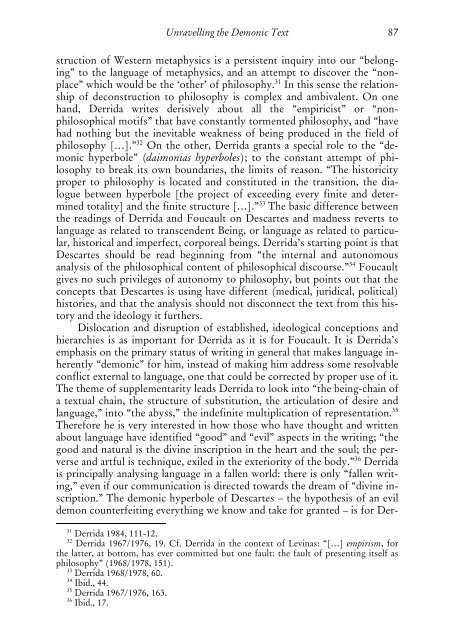Note on this edition: this is an electronic version of the 1999 book ...
Note on this edition: this is an electronic version of the 1999 book ...
Note on this edition: this is an electronic version of the 1999 book ...
You also want an ePaper? Increase the reach of your titles
YUMPU automatically turns print PDFs into web optimized ePapers that Google loves.
Unravelling <strong>the</strong> Dem<strong>on</strong>ic Text 87structi<strong>on</strong> <strong>of</strong> Western metaphysics <strong>is</strong> a pers<strong>is</strong>tent inquiry into our “bel<strong>on</strong>ging”to <strong>the</strong> l<strong>an</strong>guage <strong>of</strong> metaphysics, <strong>an</strong>d <strong>an</strong> attempt to d<strong>is</strong>cover <strong>the</strong> “n<strong>on</strong>place”which would be <strong>the</strong> ‘o<strong>the</strong>r’ <strong>of</strong> philosophy. 31 In <strong>th<strong>is</strong></strong> sense <strong>the</strong> relati<strong>on</strong>ship<strong>of</strong> dec<strong>on</strong>structi<strong>on</strong> to philosophy <strong>is</strong> complex <strong>an</strong>d ambivalent. On <strong>on</strong>eh<strong>an</strong>d, Derrida writes der<strong>is</strong>ively about all <strong>the</strong> “empiric<strong>is</strong>t” or “n<strong>on</strong>philosophicalmotifs” that have c<strong>on</strong>st<strong>an</strong>tly tormented philosophy, <strong>an</strong>d “havehad nothing but <strong>the</strong> inevitable weakness <strong>of</strong> being produced in <strong>the</strong> field <strong>of</strong>philosophy […].” 32 On <strong>the</strong> o<strong>the</strong>r, Derrida gr<strong>an</strong>ts a special role to <strong>the</strong> “dem<strong>on</strong>ichyperbole” (daim<strong>on</strong>ias hyperboles); to <strong>the</strong> c<strong>on</strong>st<strong>an</strong>t attempt <strong>of</strong> philosophyto break its own boundaries, <strong>the</strong> limits <strong>of</strong> reas<strong>on</strong>. “The h<strong>is</strong>toricityproper to philosophy <strong>is</strong> located <strong>an</strong>d c<strong>on</strong>stituted in <strong>the</strong> tr<strong>an</strong>siti<strong>on</strong>, <strong>the</strong> dialoguebetween hyperbole [<strong>the</strong> project <strong>of</strong> exceeding every finite <strong>an</strong>d determinedtotality] <strong>an</strong>d <strong>the</strong> finite structure […].” 33 The basic difference between<strong>the</strong> readings <strong>of</strong> Derrida <strong>an</strong>d Foucault <strong>on</strong> Descartes <strong>an</strong>d madness reverts tol<strong>an</strong>guage as related to tr<strong>an</strong>scendent Being, or l<strong>an</strong>guage as related to particular,h<strong>is</strong>torical <strong>an</strong>d imperfect, corporeal beings. Derrida’s starting point <strong>is</strong> thatDescartes should be read beginning from “<strong>the</strong> internal <strong>an</strong>d aut<strong>on</strong>omous<strong>an</strong>alys<strong>is</strong> <strong>of</strong> <strong>the</strong> philosophical c<strong>on</strong>tent <strong>of</strong> philosophical d<strong>is</strong>course.” 34 Foucaultgives no such privileges <strong>of</strong> aut<strong>on</strong>omy to philosophy, but points out that <strong>the</strong>c<strong>on</strong>cepts that Descartes <strong>is</strong> using have different (medical, juridical, political)h<strong>is</strong>tories, <strong>an</strong>d that <strong>the</strong> <strong>an</strong>alys<strong>is</strong> should not d<strong>is</strong>c<strong>on</strong>nect <strong>the</strong> text from <strong>th<strong>is</strong></strong> h<strong>is</strong>tory<strong>an</strong>d <strong>the</strong> ideology it fur<strong>the</strong>rs.D<strong>is</strong>locati<strong>on</strong> <strong>an</strong>d d<strong>is</strong>rupti<strong>on</strong> <strong>of</strong> establ<strong>is</strong>hed, ideological c<strong>on</strong>cepti<strong>on</strong>s <strong>an</strong>dhierarchies <strong>is</strong> as import<strong>an</strong>t for Derrida as it <strong>is</strong> for Foucault. It <strong>is</strong> Derrida’semphas<strong>is</strong> <strong>on</strong> <strong>the</strong> primary status <strong>of</strong> writing in general that makes l<strong>an</strong>guage inherently“dem<strong>on</strong>ic” for him, instead <strong>of</strong> making him address some resolvablec<strong>on</strong>flict external to l<strong>an</strong>guage, <strong>on</strong>e that could be corrected by proper use <strong>of</strong> it.The <strong>the</strong>me <strong>of</strong> supplementarity leads Derrida to look into “<strong>the</strong> being-chain <strong>of</strong>a textual chain, <strong>the</strong> structure <strong>of</strong> substituti<strong>on</strong>, <strong>the</strong> articulati<strong>on</strong> <strong>of</strong> desire <strong>an</strong>dl<strong>an</strong>guage,” into “<strong>the</strong> abyss,” <strong>the</strong> indefinite multiplicati<strong>on</strong> <strong>of</strong> representati<strong>on</strong>. 35Therefore he <strong>is</strong> very interested in how those who have thought <strong>an</strong>d writtenabout l<strong>an</strong>guage have identified “good” <strong>an</strong>d “evil” aspects in <strong>the</strong> writing; “<strong>the</strong>good <strong>an</strong>d natural <strong>is</strong> <strong>the</strong> divine inscripti<strong>on</strong> in <strong>the</strong> heart <strong>an</strong>d <strong>the</strong> soul; <strong>the</strong> perverse<strong>an</strong>d artful <strong>is</strong> technique, exiled in <strong>the</strong> exteriority <strong>of</strong> <strong>the</strong> body.” 36 Derrida<strong>is</strong> principally <strong>an</strong>alysing l<strong>an</strong>guage in a fallen world: <strong>the</strong>re <strong>is</strong> <strong>on</strong>ly “fallen writing,”even if our communicati<strong>on</strong> <strong>is</strong> directed towards <strong>the</strong> dream <strong>of</strong> “divine inscripti<strong>on</strong>.”The dem<strong>on</strong>ic hyperbole <strong>of</strong> Descartes – <strong>the</strong> hypo<strong>the</strong>s<strong>is</strong> <strong>of</strong> <strong>an</strong> evildem<strong>on</strong> counterfeiting everything we know <strong>an</strong>d take for gr<strong>an</strong>ted – <strong>is</strong> for Der-31 Derrida 1984, 111-12.32 Derrida 1967/1976, 19. Cf. Derrida in <strong>the</strong> c<strong>on</strong>text <strong>of</strong> Levinas: “[…] empir<strong>is</strong>m, for<strong>the</strong> latter, at bottom, has ever committed but <strong>on</strong>e fault: <strong>the</strong> fault <strong>of</strong> presenting itself asphilosophy” (1968/1978, 151).33 Derrida 1968/1978, 60.34Ibid., 44.35 Derrida 1967/1976, 163.36Ibid., 17.














